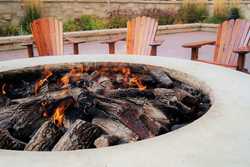- Wood type: Maple
- Construction: End-grain
- Dimensions: 30 inches long x 23.25 inches wide x 2.25 inches thick
- Weight: 41.29 pounds
- Price on publish: $326.95
Best Wooden Cutting Boards for Safe, Hygienic Food Preparation

Our evaluations and opinions are not influenced by our advertising relationships, but we may earn a commission from our partners’ links. This content is created by TIME Stamped, under TIME’s direction and produced in accordance with TIME’s editorial guidelines and overseen by TIME’s editorial staff. Learn more about it.
Once you find yourself well and truly bitten by the cooking bug, it’s astonishing just how much kitchen stuff you’ll end up investing in. But consider, for a moment, the humble chopping board: If you’re overdue for an upgrade, take a look through our list of the best wooden cutting boards for every kind of chef and kitchen.
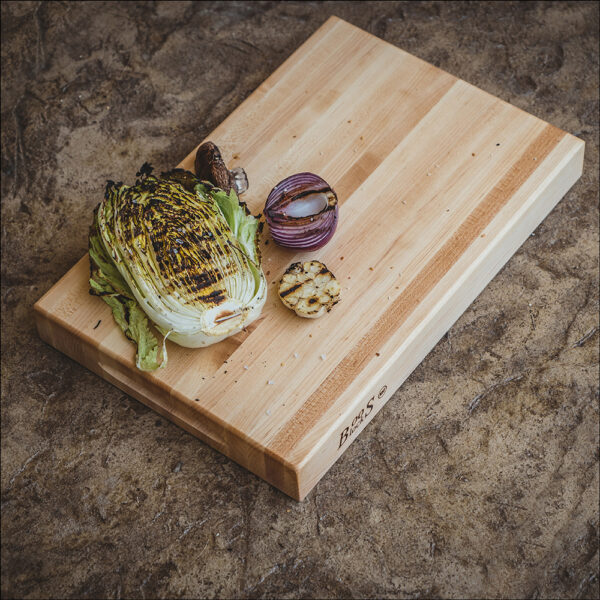
Recommended by Allen, this is a seriously hefty cutting board that works equally well for serving and displaying food as it does for chopping it up. (It also makes a great wedding gift.) As someone who owns a Boos board myself, I can attest to the quality and durability. The only proviso is that, as you’d expect from a large, solid piece of wood, it may be too heavy for some cooks to handle comfortably.
A huge, heavy, and pricey option, but one that you’ll enjoy using every day.
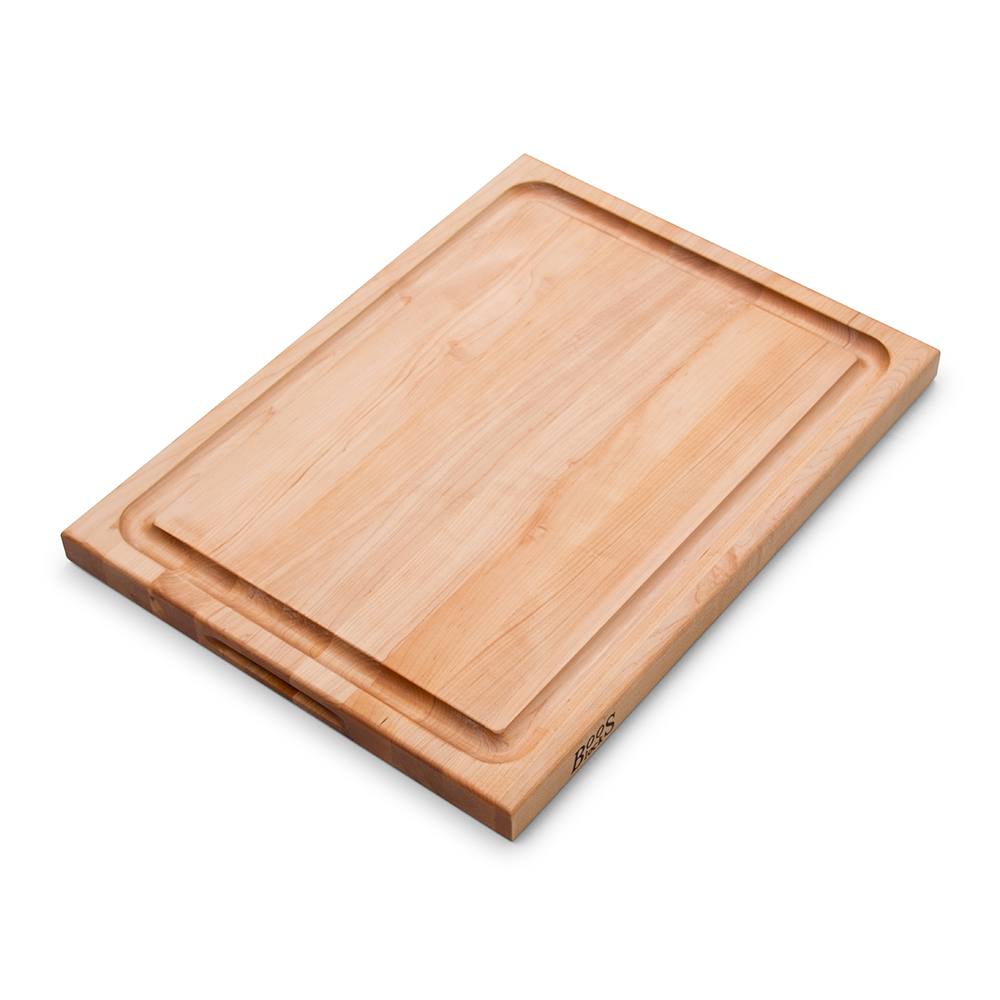
If you’re investing in a wooden cutting board, you want to know that it’s going to last, which is why we went with John Boos’ maple board for this entry. “This is a durable, hard maple, edge-grain board that features a beeswax finish (for protection, so it doesn’t need mineral oil treatment) and hand grips,” says Javaid. “As well as being reversible, it's a larger size and has an au jus groove, which is helpful for slicing large cuts of meat and other watery foods.”
A heavy duty cutting board that should last forever if you take care of it.
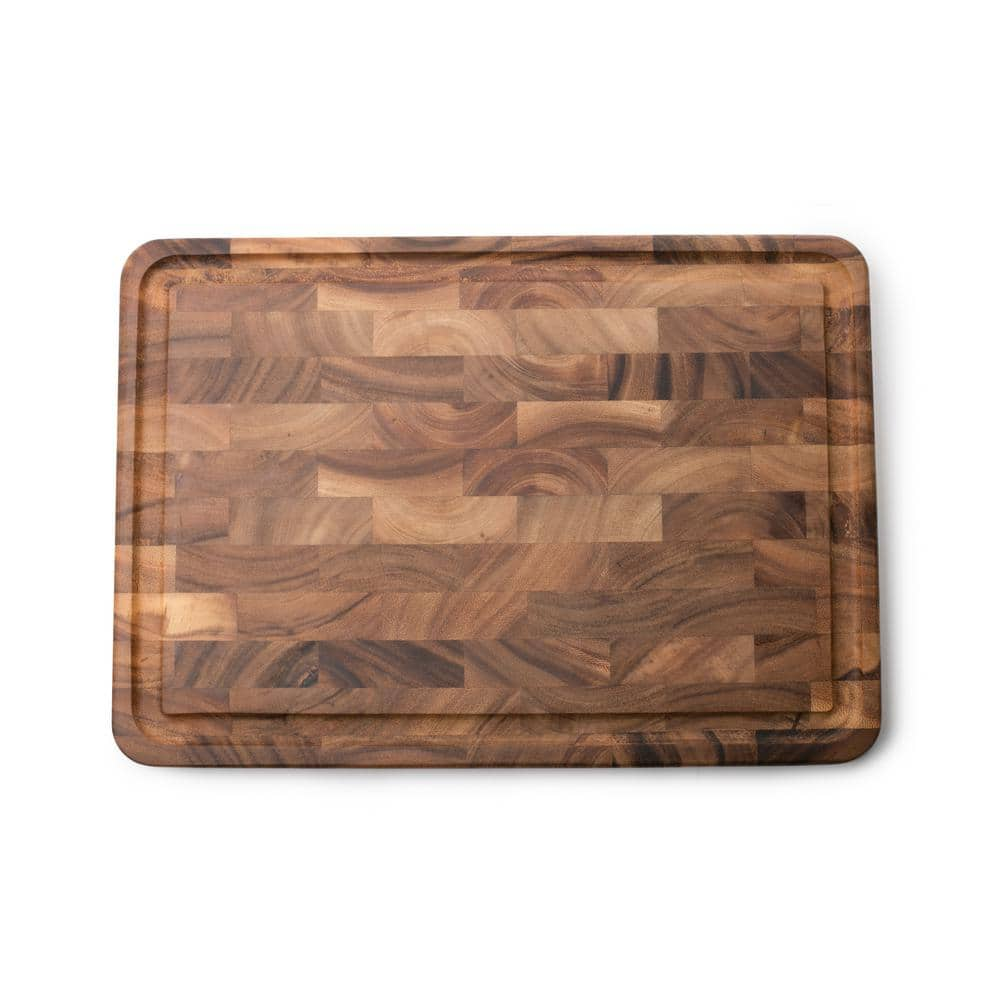
This entry comes recommended by Marie, who says that these boards are, “known for their resistance to moisture, and ease of maintenance.” Another attractive board that would work equally well as a serving platter, it requires just a quick hand wash and air dry before being back in action.
An attractive, sturdy wooden cutting board that will stand up to multiple washes with minimal maintenance.

Allen’s pick for best upgraded wooden cutting board is this set from Smirly, featuring three bamboo boards in different sizes, which all stack neatly together into their own matching holder. Both extremely practical and an attractive kitchen display piece, they’re also much less expensive than many of the options on this list.
An inexpensive and convenient option for those with minimal storage space.

If your wooden cutting board purchase is being inspired by some serious carnivore urges, this is the one for you. “The Lipper International 1240 Acacia Carving Board is a great option for meat,” says Javaid. “It uses Acacia wood, which is stronger than oak and has natural moisture resistance, much like maple. The groove on this board is a bit wider, too, for effectively catching the juices from meat.” Shopping tip: While you’re at it, consider upgrading your meat thermometer to ensure the best possible results.
A meat-lovers board, made from thick, sturdy acacia and featuring an extra-wide jus groove.
/https://static.havenly.com/product/production/md5_c05ad1961030e96d30064b41cba44f47.jpeg)
As mentioned earlier, end-grain cutting boards are more durable than edge-grain, and due their more complex construction process, may also be more expensive. But while this entry is certainly pricey, you’re getting a truly solid piece of kitchenware. “The Crate & Barrel Rectangular Acacia End-Grain Cutting Board is an intricate end-grain design that is hand-carved and 3.2 inches thick,” says Javaid. “The board certainly embraces the aesthetic choice of end grain designs, although it is at a higher price point.”
A superbly-constructed, elegant wooden cutting board, albeit a hefty one in terms of both weight and price.
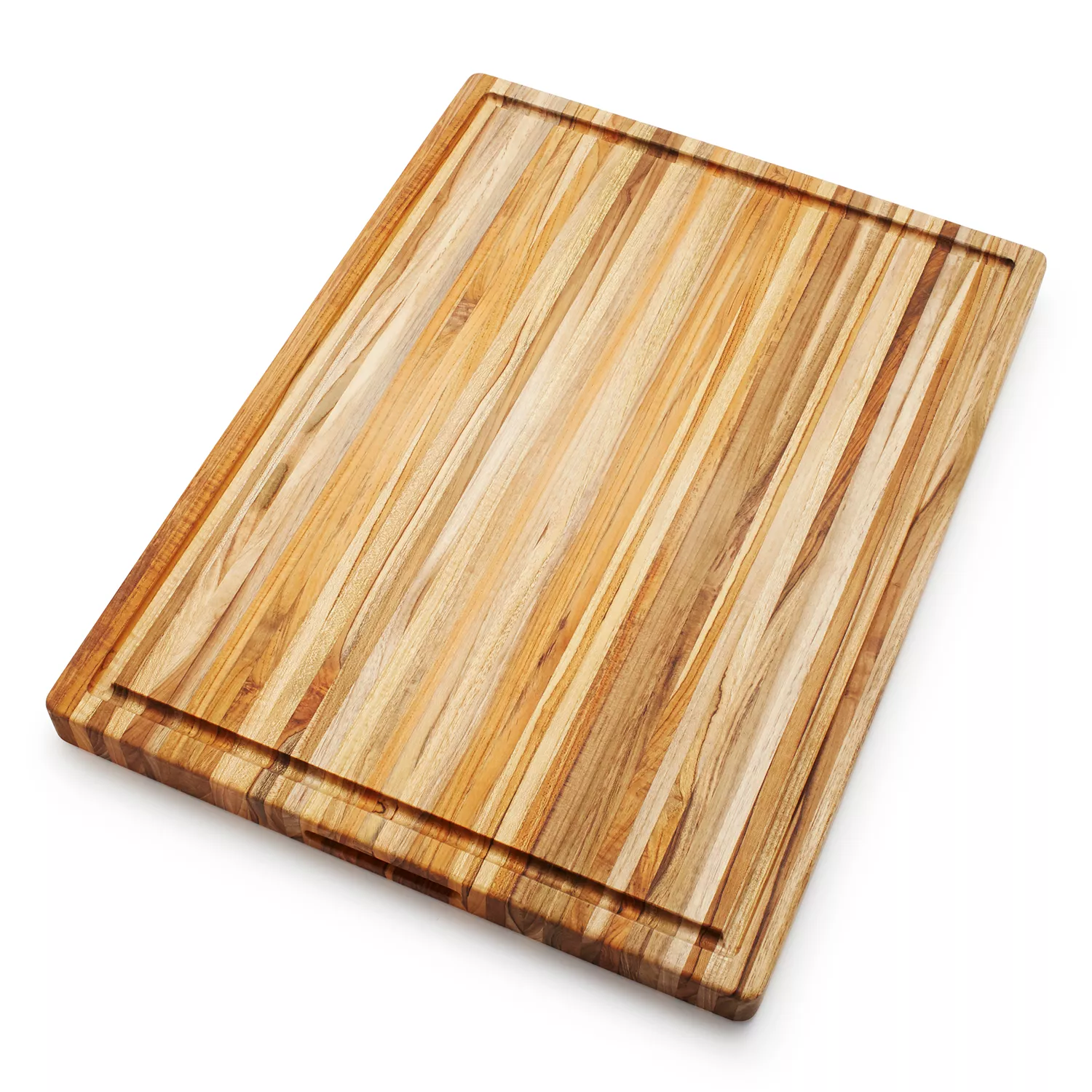
For a more elevated edge-grain board, Javaid recommends checking out the TeakHaus Edge-Grain Cutting Board. “It’s made of durable teak wood, which is a good choice for edge-grain models,” he says. “This model has hand grips for convenience and has a more interesting aesthetic design than most other edge-grain cutting boards, almost resembling an end-grain model.”
A high-end edge-grain option with the look of an end-grain cutting board.
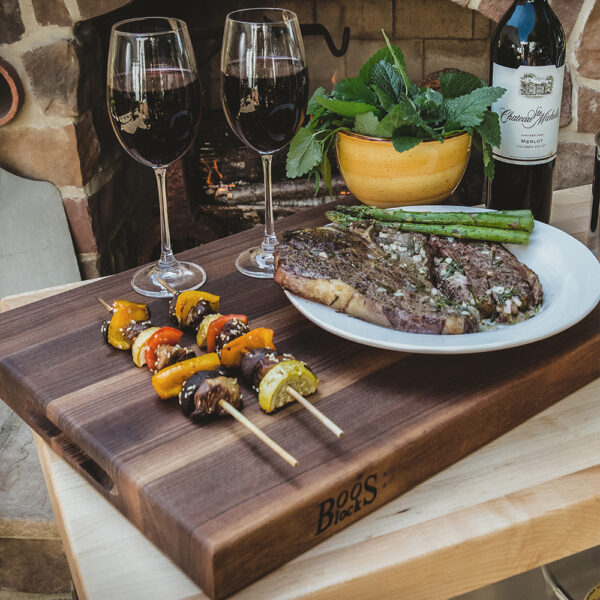
If you’re planning on doing more than chop stuff up on your board—using it to serve charcuterie alongside instead of breaking out your best dinnerware sets for example—then a high-end option might be better for you. “This is another option from John Boos that offers a more luxurious feel,” says Javaid. “It’s made from high-quality walnut, which not only gives it a rich color and grain but also makes it durable and resistant to knife marks.”
A luxuriously-designed wooden cutting board with a luxury price tag to match.

Wooden cutting boards can get surprisingly expensive, but for a more affordable option that will actually last, this is a solid bet. “The Maison Rodin cutting board with a juice groove is an excellent, affordable option for anyone looking for a high-quality wood cutting board,” says Javaid. “It’s constructed from maple and can collect up to two fluid ounces of liquid in the groove. It does, however, require regular application of mineral oil for protection.”
A reasonably-priced, sturdy cutting board with the added bonus of being reversible.
Our selections were made through a combination of expert advice, personal experience, and ensuring everything on our list has majority positive customer reviews, especially in terms of longevity, construction, and value for money.
“The first thing you should consider when comparing wood cutting boards is the grain style,” says Fahad Javaid, general manager, operations at Zanduco. “Edge-grain wood cutting boards are cut with the grain, whereas end-grain wood cutting boards are created by fusing cross-section pieces together, making them more challenging to construct. While end-grain cutting boards tend to be more durable to knife indents, they also can be more porous, making them susceptible to moisture. These cutting boards require more care and cleaning to ensure the wood does not hold onto moisture that could potentially harbor bacteria.”
“Cutting boards are made from dense lumber that has closed grains, such as cherry, maple, and walnut, which will cut flat and not have excessive knots,” says Javaid. “You may also consider bamboo, which is actually a grass material that’s quite durable and more sustainable. However, bamboo cutting boards tend to dull knives faster with constant use. For more advanced chefs who do lots of chopping with chef knives, you should lean toward a tighter-grained wood [maple, cherry, oak, or walnut] that will be less porous and more durable without dulling your knives.”
Additionally, April Marie, founder of The Curvy Italian sauce range, advises that you, “Avoid softwoods such as pine or cedar, which are less hygienic and more prone to damage.”
“Think about the size of the board and how it will fit into your workspace and cooking needs,” advises Lauren Allen, founder of Tastes Better from Scratch. “Larger boards provide more room but small boards work well in limited spaces. Determine how you’ll primarily use the board as well (meat vs. produce) to choose one suited for the task.”
“The bottom line is that wood and bamboo cutting boards last longer than plastic, making them much more sustainable,” says Javaid. “Plastic tends to be a more affordable option in many cases, and they do not dull knives, which is a bonus. They can, however, become warped if you put them in the dishwasher, making it harder to complete food prep as the board does not lay flat.”
“Caring for a wooden cutting board includes hand washing only with hot water and mild detergent, drying thoroughly with a towel, and applying food-grade mineral oil monthly to condition and protect the wood,” says Allen. “Occasional light sanding can refresh the surface if deep grooves develop.”
First off, avoid the dishwasher with wooden cutting boards. “It's best to initially scrape off debris with a damp cloth, then wash, avoiding soaking or using harsh detergents which may damage the wood,” says Allen. “You should also periodically sanitize a wood board using a diluted vinegar solution or food-safe disinfectant spray, in order to kill lingering bacteria. The best oil to apply is USP-grade mineral oil, which is odorless, tasteless, and specifically intended for cutting board conditioning.”
“You will most commonly see maple, cherry, and walnut, which are dense woods that are the most durable,” says Javaid.
“Wood naturally has antimicrobial properties, but it’s still important to keep it clean from moisture,” warns Javaid. “Sanitizing the wood with soap and water or vinegar and water will be effective for keeping it clean and food-safe.”
“Mineral oil is the industry standard for wooden cutting boards,” says Javaid. “It’s often also called liquid paraffin and is the best food-safe option. You can also use a beeswax finish, which will give your cutting board some shine and is water-resistant.”
“As long as you care for your cutting board properly, wood, bamboo, and plastic are all safe options,” says Javaid. “Proper cleaning will be essential for keeping bacteria away.”
The information presented here is created by TIME Stamped and overseen by TIME editorial staff. To learn more, see our About Us page.
